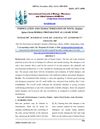 April 2023 in “Journal of Investigative Dermatology”
April 2023 in “Journal of Investigative Dermatology” Both laser treatments improved acne scars similarly, but the Nd:YAG laser was safer and less painful, while the Er:YAG laser left patients slightly more satisfied.
January 2020 in “대한미용학회지” Natural ingredients like plant extracts and marine life show promise for improving scalp health and reducing hair loss.
[object Object]  January 2016 in “Springer eBooks”
January 2016 in “Springer eBooks” New materials and methods could improve skin healing and reduce scarring.
 9 citations,
November 2018 in “Drug Discovery Today”
9 citations,
November 2018 in “Drug Discovery Today” Using skin stem cells and certain molecules might lead to scar-free skin healing.
 295 citations,
March 2016 in “Life Sciences”
295 citations,
March 2016 in “Life Sciences” Air pollution worsens skin diseases and aging by causing inflammation and oxidative stress.
 10 citations,
December 2015 in “Clinics in Dermatology”
10 citations,
December 2015 in “Clinics in Dermatology” Diabetes can lead to blindness and skin problems, and managing blood sugar and blood pressure is crucial to prevent these complications.
 466 citations,
August 2004 in “Journal of the American Academy of Dermatology”
466 citations,
August 2004 in “Journal of the American Academy of Dermatology” Rosacea is a skin condition with unclear causes, classified into four subtypes.
 33 citations,
September 2016 in “Lasers in Surgery and Medicine”
33 citations,
September 2016 in “Lasers in Surgery and Medicine” Fractional resurfacing is safe and effective for certain skin conditions in Asian patients, but care must be taken to avoid skin pigmentation issues.
 5 citations,
January 2023 in “Journal of the European Academy of Dermatology and Venereology”
5 citations,
January 2023 in “Journal of the European Academy of Dermatology and Venereology” Experts advise using sunscreen and proper skin care before, during, and after procedures to speed healing, prevent complications, and reduce scarring.
 3 citations,
October 2022 in “Clinical, Cosmetic and Investigational Dermatology”
3 citations,
October 2022 in “Clinical, Cosmetic and Investigational Dermatology” The 532 nm laser effectively reduces facial vascular and pigmented lesions, with the VISIA system reliably assessing treatment results.
50 citations,
December 2000 in “Journal of Pharmaceutical Sciences” Hair follicles significantly enhance electroosmotic transport during iontophoresis.
 64 citations,
May 2019 in “Materials Science and Engineering: C”
64 citations,
May 2019 in “Materials Science and Engineering: C” Microneedle technology has improved drug delivery and patient comfort but needs more research for broader use.
 39 citations,
June 2017 in “Journal of Applied Research on Medicinal and Aromatic Plants”
39 citations,
June 2017 in “Journal of Applied Research on Medicinal and Aromatic Plants” Plant-based ingredients are effective and safe for modern skincare products.
 39 citations,
April 2011 in “Recent Patents on Drug Delivery & Formulation”
39 citations,
April 2011 in “Recent Patents on Drug Delivery & Formulation” Nanoemulsion-based drug delivery systems are versatile and have potential for treating various medical conditions and improving vaccines.
 8 citations,
June 2022 in “International Journal of Molecular Sciences”
8 citations,
June 2022 in “International Journal of Molecular Sciences” Tiny particles called extracellular vesicles show promise for skin improvement and anti-aging in facial care but face challenges like low production and lack of research.
May 2024 in “International journal of molecular sciences” Platelet-derived products help regenerate tissue and are used in various skin and hair treatments.
 March 2022 in “IntechOpen eBooks”
March 2022 in “IntechOpen eBooks” Botulinum Neurotoxin-A can treat acne, oily skin, rosacea, hair loss, prevent scars, relieve nerve pain, reduce excessive sweating, and manage psoriasis, but more trials are needed to confirm its effectiveness.
34 citations,
January 2022 in “Molecules/Molecules online/Molecules annual” Natural ingredients in cosmeceuticals are beneficial for skin and hair health with few side effects.
 34 citations,
December 2012 in “Indian Journal of Dermatology, Venereology and Leprology”
34 citations,
December 2012 in “Indian Journal of Dermatology, Venereology and Leprology” Mesotherapy shows promise for cellulite and facial rejuvenation but has mixed results for body sculpting and hair loss, with more research needed for safety and effectiveness.
5 citations,
August 2022 in “Mediators of Inflammation” Combining Pulsed Dye Laser with Pingyangmycin is effective and safe for treating acne scars.
 October 2023 in “Cognizance journal”
October 2023 in “Cognizance journal” The document suggests using natural remedies like bloodletting and honey for various health issues but lacks scientific evidence for their effectiveness.
1 citations,
August 2024 in “Cosmetics” Melasma treatment is difficult, but combination therapies and personalized plans show promise.
61 citations,
April 2023 in “Bioactive Materials” Microneedles are effective for painless drug delivery and promoting wound healing and tissue regeneration.
 November 2022 in “International journal of biology, pharmacy and allied sciences”
November 2022 in “International journal of biology, pharmacy and allied sciences” The new herbal shampoo is effective, safe, and more affordable than other products.
[object Object]  19 citations,
May 2016 in “Clinical, cosmetic and investigational dermatology”
19 citations,
May 2016 in “Clinical, cosmetic and investigational dermatology” FGF-2&D/P nanoparticles can help treat hair loss.
 10 citations,
January 2014 in “Endocrinology & metabolic syndrome”
10 citations,
January 2014 in “Endocrinology & metabolic syndrome” PCOS is a long-term condition that needs more research for better understanding and treatment.
 2 citations,
February 2019 in “Journal of dermatological treatment”
2 citations,
February 2019 in “Journal of dermatological treatment” A new surgical technique effectively cures acne in most patients.
 January 2025 in “International Journal of Advanced Research in Science Communication and Technology”
January 2025 in “International Journal of Advanced Research in Science Communication and Technology” Polyherbal hair dyes are safer and more eco-friendly than chemical dyes.
 October 2024 in “International Journal of Pharmaceutical Sciences Review and Research”
October 2024 in “International Journal of Pharmaceutical Sciences Review and Research” A 5% minoxidil spray could effectively treat male baldness with fewer side effects and better patient comfort.
 April 2024 in “Applied biological chemistry”
April 2024 in “Applied biological chemistry” Piperine from black pepper can make hair less oily by blocking fat cell development in hair roots.






















